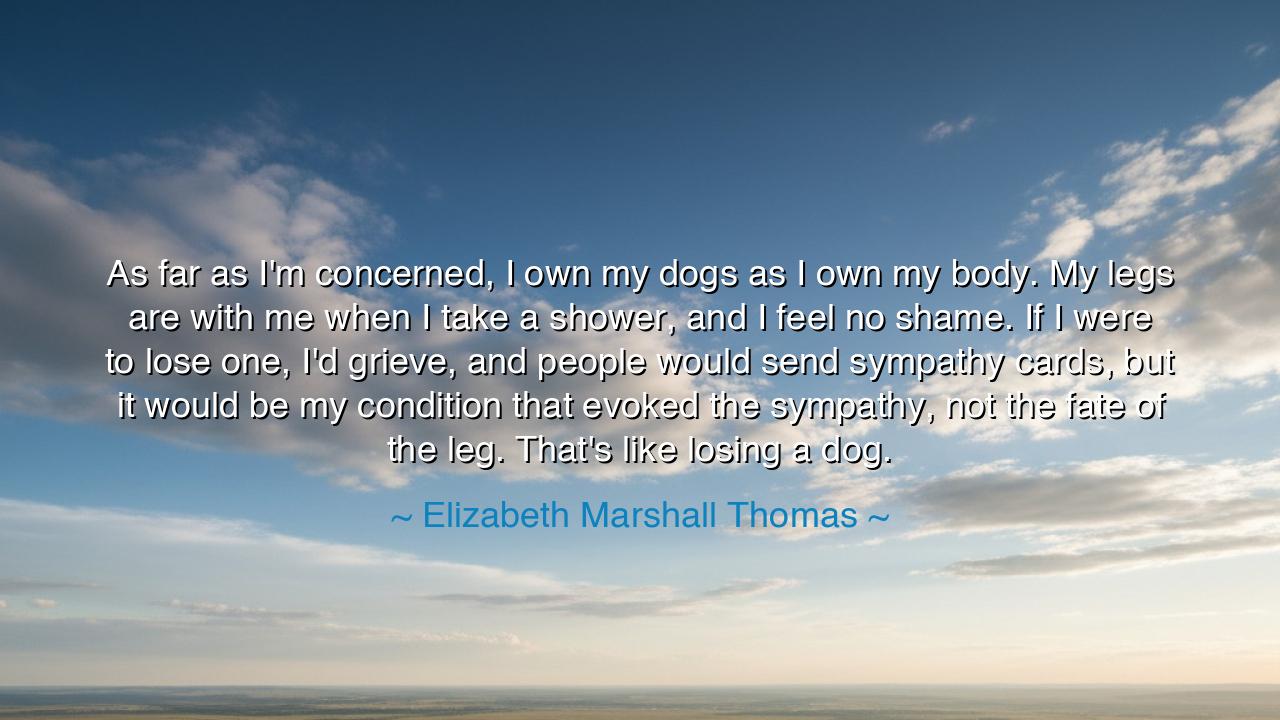
As far as I'm concerned, I own my dogs as I own my body. My legs
As far as I'm concerned, I own my dogs as I own my body. My legs are with me when I take a shower, and I feel no shame. If I were to lose one, I'd grieve, and people would send sympathy cards, but it would be my condition that evoked the sympathy, not the fate of the leg. That's like losing a dog.






Hear now, O listeners, the striking and unusual words of Elizabeth Marshall Thomas, who spoke of life, loyalty, and loss: “As far as I’m concerned, I own my dogs as I own my body. My legs are with me when I take a shower, and I feel no shame. If I were to lose one, I’d grieve, and people would send sympathy cards, but it would be my condition that evoked the sympathy, not the fate of the leg. That’s like losing a dog.” At first these words seem peculiar, even startling, yet within them lies a truth about the bond between human and animal, the nature of companionship, and the way we grieve.
Thomas, an observer of both people and creatures, draws a powerful comparison. She likens her dogs to her legs, not as possessions to be used and discarded, but as extensions of herself—inseparable, vital, and unquestioned. Just as a person does not parade their legs with pride, nor feel shame in their presence, so too she regards her animals as part of her being. They are not trophies to show, nor property to flaunt, but living companions so close that they are woven into her sense of self.
The imagery of loss deepens the meaning. To lose a dog, she says, is like losing a leg: it is grief, not for the leg itself, but for the condition of being without it. The world sends sympathy not to the fallen limb, but to the person who must endure its absence. Likewise, when a beloved dog dies, it is not merely the end of an animal’s life, but the shattering of the wholeness between human and companion. It is the survivor’s new condition—bereft, incomplete—that evokes sorrow. Thus Thomas captures the profound intimacy of this bond, in which the animal is not outside the human but part of their very fabric of being.
History shows us that such bonds have always existed. The Egyptians mummified their cats and buried them with honor, for they believed that the loss of an animal companion diminished the soul. In Homer’s Odyssey, the faithful dog Argos waited twenty years for his master’s return, only to die upon recognizing him at last—a moment that reveals the deep grief of separation, both for man and beast. In both tales, we see the truth Thomas voices: animals are not mere possessions, but limbs of the heart, and their loss tears at the wholeness of life.
The deeper meaning of her words lies also in the nature of sympathy. Society often extends compassion selectively, offering ritual condolences for human loss, but treating the death of animals as lesser grief. Thomas defies this hierarchy. She declares that losing a dog deserves the same acknowledgment as losing part of one’s own body. The grief is not lessened because the being was an animal; the bond was real, and its absence is felt as a wound. Her wisdom calls us to broaden our sympathy, to honor grief wherever it arises, human or animal.
The lesson, O listener, is clear: recognize the sacredness of bonds, even those not written into the laws of men. If your heart is bound to another—be it family, friend, or animal—then their loss is real, and grief is valid. Do not diminish the sorrow of others when they mourn a pet, for you would not laugh at one who lost a limb. Instead, offer sympathy, as you would for any wound, knowing that in such compassion you honor not only the mourner, but also the love that made the grief possible.
Therefore, carry this teaching with you: cherish your companions, human or animal, as parts of yourself. Live in gratitude for their presence, knowing that loss will one day come, but also that love is worth the pain. And when loss does arrive, allow yourself to grieve fully, without shame, for grief is the measure of love. In doing so, you will live more wholly, more tenderly, and with a heart attuned to the eternal truth—that we are never only ourselves, but are made whole by the bonds we share.
Thus let the words of Elizabeth Marshall Thomas endure: to lose a dog is to lose a part of one’s own being, and to grieve such a loss is no small sorrow. For love, wherever it is found, is the thread that qualifies life for immortality.






AAdministratorAdministrator
Welcome, honored guests. Please leave a comment, we will respond soon